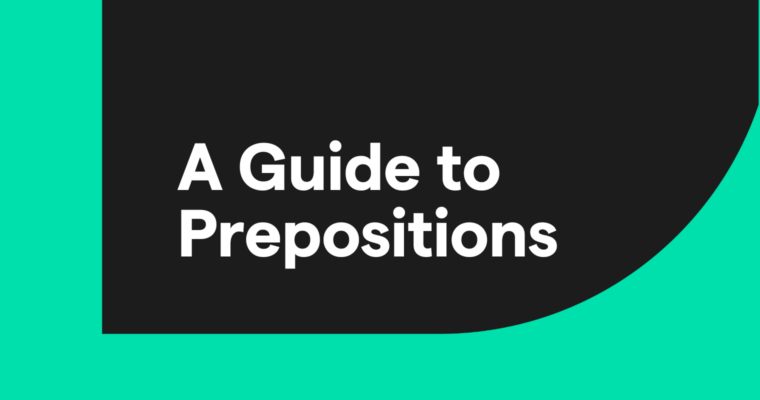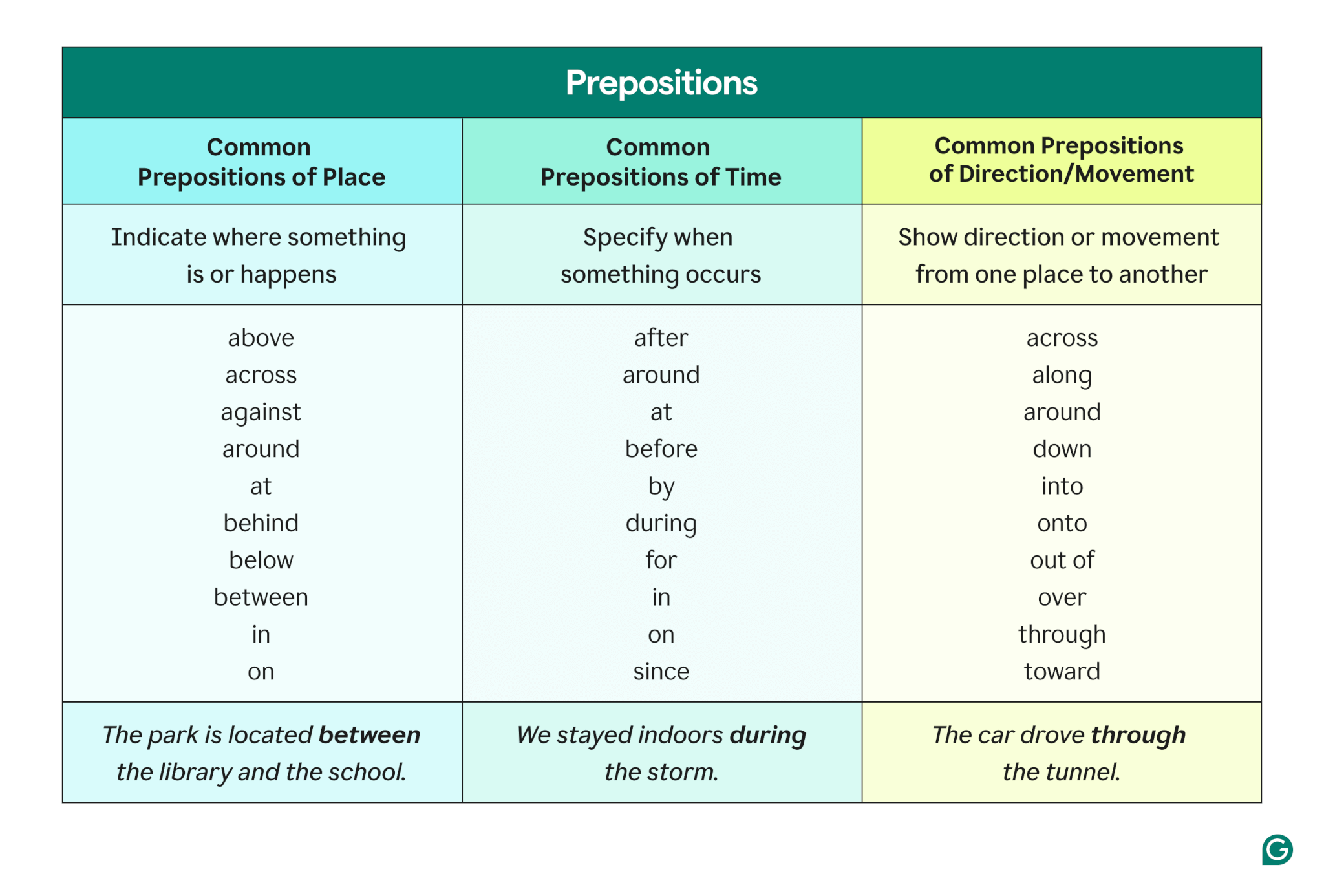
- Prepositions are parts of speech that show relationships between words in a sentence. In “the book on the table,” the preposition on shows the relationship between the book and the table.
- They often indicate where (“She walked through the park”), when (“We met at noon”), why (“He succeeded because of hard work”), or how something happens (“She completed the task with ease”).
- While some believe that ending a sentence with a preposition is incorrect, it is not actually a grammatical error.
- Many words and phrases require specific prepositions, so understanding their correct usage is essential for clear and natural communication. For example, we say “interested in” (not “interested on”).
- Prepositions play a key role in phrasal verbs and collocations, where changing the preposition can alter the meaning of a phrase entirely. For example, “look up” (search for information) and “look after” (take care of) have very different meanings.
Prepositions are small but powerful words that help clarify relationships between different parts of a sentence. Here, we’ll discuss how prepositions work, the different types of prepositions, and how to use them effectively in writing and speech.
Table of contents
Ending a sentence with a preposition
What is a preposition?
Prepositions are small words that describe relationships with other words in a sentence, such as where something took place (“in a park) or when (“at noon”). Prepositions combine with other words to form a prepositional phrase.
- Preposition: to
- Prepositional phrase: to the moon
These prepositional phrases can describe nouns (“the cat on the shelf”) or verbs (“run through the grass”). Although you can place prepositional phrases in different places, it’s best to put them close to the word they describe.
Each prepositional phrase must contain a noun, known as the object of a preposition. The prepositional phrase often includes a determiner with the object, like the articles the, a, or an. Sometimes, the object also has its own adjective, like “on the wooden table.”
List of prepositions
Below is a list of commonly used prepositions, organized alphabetically:
A: aboard, about, above, absent, across, after, against, along, alongside, amid (or “amidst”), among (or “amongst”), around, as, at, atop
B: bar (or “barring”), before, behind, below, beneath, beside (or “besides”), between, beyond, but, by
C: circa, concerning, counting
D: despite, down, during
E: effective, except (or “excepting”), excluding
F: failing, following, for, from
I: in, including, inside, into
L: less, like
M: minus
N: near, next, notwithstanding
O: of, off, on, onto, opposite, out, outside, over
P: past, pending, per, plus
R: regarding, respecting
S: short, since
T: than, through, throughout, to, toward (or “towards”)
U: under, underneath, unlike, until, up, upon
V: versus (or “vs.”), via
W: wanting, with, within, without, worth
Types of prepositions
People categorize prepositions in different ways, and there is no official grouping. However, the most common prepositions fit into four main categories, with a fifth category for additional types. Keep in mind that a preposition can have more than one meaning, and sometimes, the same preposition belongs to more than one type.
Here are the main types of prepositions.
Prepositions of place
Prepositions of place show where something is or where something happened. The objects of prepositions of place can refer to a specific location or describe a location in relation to another thing, such as “under the table.”
Prepositions of time
Prepositions of time show when something happened or will happen (and sometimes its duration). They always describe verbs, such as when the verb’s action occurs.
Prepositions of direction or movement
Prepositions of direction or movement show how something is moving or which way it’s going. For example, in the sentence “The dog ran in a circle,” the prepositional phrase “in a circle” describes how it ran instead of where it ran. These prepositions are usually used with verbs of motion.
Prepositions of manner, cause, or purpose
Prepositions of manner, cause, or purpose show how or why something happens, such as describing the way or the reasons something occurred. This includes descriptions of feelings or opinions, as well as comparisons.
Additional types of prepositions
Prepositions can show many other relationships, but they’re not as common as the four types of prepositions above. Let’s look at some other, less common types of prepositions you can use.
Prepositions of possession show ownership or describe a trait someone possesses. The most common preposition of possession is of, but with can also be used to describe a distinguishing trait.
Prepositions of source explain where something came from or who created it, typically using from or by.
Prepositions of measurement refer specifically to quantities and amounts, usually with units of measurement. The most common are by and of. Likewise, fractions and percentages use the preposition of when describing what they’re part of.
Ending a sentence with a preposition
The old claim that it’s wrong to end a sentence with a preposition has been debunked. It’s not true now and it never was true. In other words, ending a sentence with a preposition is perfectly fine. Writers who insist that a preposition can’t end a sentence often end up with stilted and unnatural-sounding sentences:
That said, it is sometimes more elegant to move a preposition to an earlier spot in a sentence, especially in very serious and formal writing. But if you do move the preposition, remember to delete it from the end.
Unnecessary prepositions
One of the most common preposition mistakes is adding an unnecessary at to the end of a question.
Although this is common in some English dialects, it’s considered nonstandard in writing. You can fix the problem by simply deleting the at.
If you’re not sure which preposition to use, sometimes you can just get rid of it altogether. In fact, you should always eliminate unnecessary prepositional phrases, as too many can be a sign of unfocused writing.
Look at how many prepositions appear in the sentence below:
Getting rid of the prepositions forces you to tighten up the sentence. The result is shorter, more direct, and easier to understand:
Here’s another example:
Remove the up. You don’t need it:
Other uses of prepositions
Sometimes, prepositions are combined with other parts of speech to form phrases with entirely new meanings. These phrases don’t act like prepositional phrases, and they take on different functions and usages in a sentence.
Prepositions in phrasal verbs
A phrasal verb is a group of words that together act as a single verb with a unique meaning. For example, the phrasal verb go out has a different meaning than the words go and out. Often, phrasal verbs combine an existing verb with a preposition.
If you’re new to prepositions, pay close attention to phrasal verbs. While some prepositions can be interchangeable in general use, the meaning of a phrasal verb always depends on a specific preposition. Changing the preposition can completely alter the meaning of the phrase.
For example, the prepositions on and over can sometimes mean the same thing, such as on the stove and over the stove. But the phrasal verbs come on and come over have very different meanings. When using phrasal verbs, make sure you’re using the correct preposition and treat each verb as its own word.
Collocation
In linguistics, collocation is just a fancy word to describe words that are commonly used together. In English, we have certain phrases or ways of talking that use specific prepositions; even if a different preposition has the same meaning, it would sound weird to use it.
Prepositional collocations can be tricky for people whose first language isn’t English and even for those who have spoken English their entire lives. Here are a few common phrases in English that use specific prepositions.
- at last
- at once
- by chance
- by mistake
- charge for
- comment on
- commit to
- focus on
- for a change
- for example
- in advance
- in common
- in danger
- in particular
- insist on
- interest in
- memory of
- on purpose
- on time
- out of reach
- preference for
- protect from
- responsible for
- subscribe to
- without fail
Prepositions FAQs
What are prepositions?
Prepositions are small words that describe relationships with other words in a sentence, such as where something took place (in a park) or when (at noon). Prepositions can be combined with other words to form a prepositional phrase.
What are the types of prepositions?
People categorize prepositions in different ways, but the most common types are:
- Prepositions of time
- Prepositions of place
- Prepositions of direction or movement
- Prepositions of manner, cause, or purpose
Less common but still relevant are prepositions of possession, prepositions of source, and prepositions of measurement.
What are some preposition examples?
- Prepositions of place include above, at, besides, between, in, near, on, and under.
- Prepositions of time include after, at, before, by, during, in, on, and until.
- Prepositions of direction or movement include across, around, into, onto, over, through, to, and toward (towards).
- Prepositions of manner, cause, or purpose include by, in, for, like, and with.
Can you end a sentence with a preposition?
Yes! In fact, sometimes it’s better to end a sentence with a preposition than to rearrange all the words. The idea that this is a mistake is a myth.
Are prepositions capitalized in titles?
While different style guides have different rules for capitalization in titles, most generally agree that short prepositions in titles should be lowercase unless they are the first or last word. For example, For Whom the Bell Tolls and Lord of the Flies are both correct.







